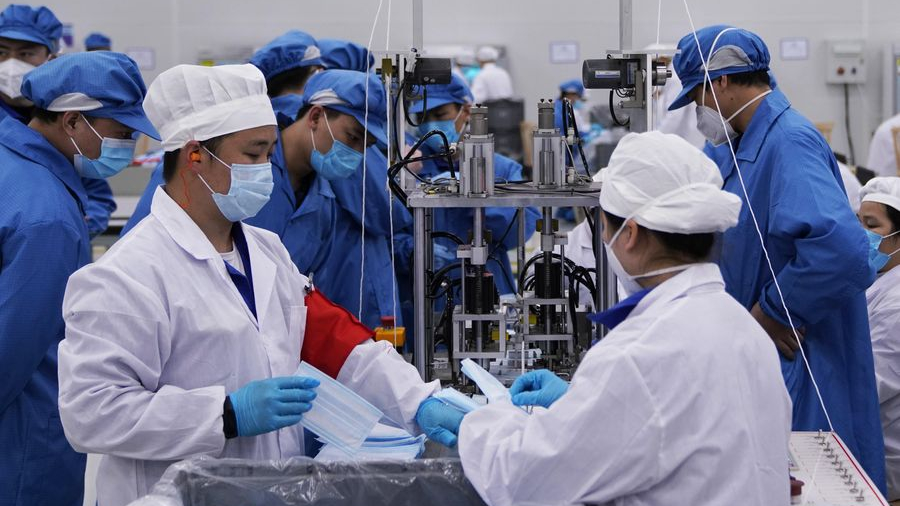China's kindness should not be misunderstood
CGTN, Updated 10:17, 01-Apr-2020
Jiang ShixueShare

Workers make face masks on production lines at a workshop of SAIC-GM-Wuling (SGMW), a major Chinese automobile manufacturer in Liuzhou City, south China's Guangxi Zhuang Autonomous Region, Feb. 16, 2020. (Xinhua/Yang Chi)
Editor's note:Jiang Shixue is a professor at the Institute of Global Studies at Shanghai University. The article reflects the author's opinions, and not necessarily the views of CGTN.
One of my best European friends, a renowned scholar on China-Europe relations and many other areas related to European affairs, sent me his newly-published article about the battle against COVID-19.
In the article he writes, "Chinese attempt[s] to use the crisis to increase their presence in Europe and America…will be viewed with a lot more suspicion this time…Within the EU, at least, Beijing's charm offensive will therefore not really change the image of China as a power whose assertions always have to be taken with a pinch of salt."
What he says is only his own judgement on the sentiment in Europe. Sadly, these days this sentiment is on the rise in Europe and America.
Apparently, this kind of sentiment is a reflection of the misunderstanding and misjudgment of China's actions to other countries' efforts to overcome the global health crisis.
COVID-19, which is ravaging every corner of the globe now, has dealt a heavy blow to the world economy and caused serious disruptions to the daily life of hundreds of millions of people. Worse, more than 20,000 people have lost their lives as of March 31.
China is the first victim of the coronavirus. Thanks to the government's decisive action and strong support from many foreign countries, China is witnessing a welcome end to the pandemic.
According to a saying in Chinese culture, the grace of dripping water should be reciprocated by a gushing spring. When China was fighting the coronavirus, many countries, including some European countries, rushed to offer cash or other donations. Now it is China's turn to help others with their wars against the pandemic.
Everyone knows that the COVID-19 is a kind of non-traditional security threat. One of the most effective ways of dealing with this threat is to strengthen international cooperation as the virus spreads ferociously around the world. As a rising global power, China should undertake responsibility in an effort to strengthen this kind of cooperation. It is reported that China has sent doctors and medical supplies such as masks and respirators to many countries. A friend in need is a friend indeed.
As a matter of fact, the pandemic also heightens the importance of building what Chinese President Xi Jinping describes as a community of shared future for mankind. As my friend writes in his article, "Viruses do not have a nationality, governments do." Governments around the world should unite to strengthen the power of the mankind to defeat the virus.
Chinese people might ask why their selfless action is misunderstood. The explanations might be two-fold: On the one hand, there is the mistaken belief that China wants to redeem itself because of the earlier so-called "cover-up"; on the other, there is a pair of tinted lenses which views whatever China does as wrong.

Francesco Rocca, the president of the International Federation of Red Cross and Red Crescent Societies, speaks to reporters at Rome's Fiumicino Airport, March 12, 2020. /China's Embassy to Italy
From the U.S. Secretary of State, Mike Pompeo, to international media outlets, China is criticized for trying to cover up the emergence of the coronavirus. In reality, however, China reported to the WHO office in Beijing as early as on December 31, 2019. On January 11, 2020, WHO said that China had shared the genetic sequence of the novel coronavirus, which is of great importance for developing specific diagnostic kits.
The tinted lenses, characteristic of ideological bias and cold-war mentality, often views China as posing a threat to the world. As a result, whatever China does is wrong.
That is to say, if China is more generous, suspicion will arise that it wishes to achieve some political purposes by means of a charm offensive. If China contributes less, it will also be criticized for a lack of generosity.
After Haiti was hit by an earthquake in early 2010, for instance, many countries pledged to help rebuild the Caribbean nation. China agreed to donate 1.5 million U.S. dollars. An article published byThe Miami Heraldon April 3, 2010, criticized China for contributing too little. "China should be ashamed of its aid to Haiti…If China wants to be a well-respected world power, it should be a better global citizen…It's time for China to try to earn other countries' respect as a trusted partner and a good global citizen, like other big countries do," commented the newspaper.
When a typhoon hit the Philippines in November 2013, China announced that it would offer assistance in the amount of 100,000 U.S. dollars.The New York Timeslinked the amount of donation to "the frosty relations between the two countries."
It seems that in those times, many wanted to see China become more "generous." But when China started to offer more help, all of sudden, its motives invited suspicion. Indeed, if you wish to beat a dog, you can easily find a stick.
The battle against the COVID-19 is still going on in many countries. To gain an early victory, all the nations should join hands. China's willingness to help others should be encouraged, not criticized. To paraphrase a Chinese proverb, a man's kind heart should not be regarded as the liver and lung of a donkey.
(If you want to contribute and have specific expertise, please contact us at opinions@cgtn.com.)
